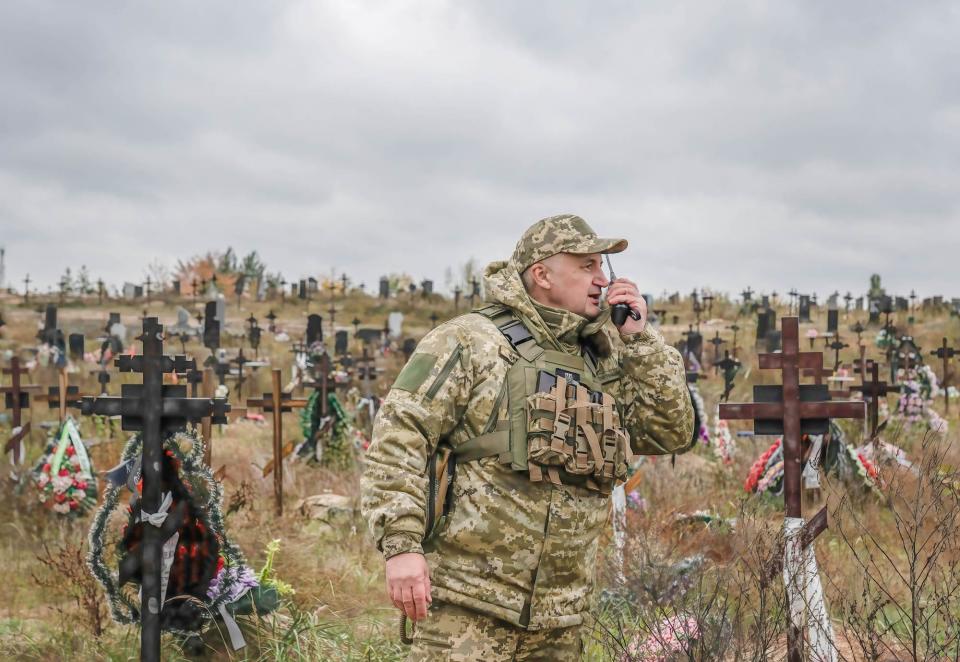As Ukrainian forces recaptured a key town, another elite Russian unit appeared to go through 'the meat grinder'

During Ukraine's counteroffensive this fall, its troops surrounded the city of Lyman.
Lyman is an important hub in eastern Ukraine, and a larger Russian force was trapped there.
Russian troops in Lyman and those who retreated took heavy losses, including an elite GRU unit.
As September rolled around, most everyone expected the Ukrainian military to launch a major attack against Russian forces in Kherson in the south.
For weeks, Ukrainian forces had been using US-supplied M142 High Mobility Artillery Rocket Systems to launch long-range precision strikes on Russian supply lines and communications networks in southeastern Ukraine.
However, the Ukrainians surprised the Russians and the world by launching a fast-paced counteroffensive in the east around Kharkiv, Ukraine's second-largest city. In just a few days, Ukrainian forces took back hundreds of square miles of territory and scores of villages.
The fact that the Russian high command had decided to mass considerable forces in the south to defend Kherson, which Moscow ended up retreating from in November, aided Kyiv's counteroffensive, which sliced through Russian lines like a hot knife through butter and repeatedly flanked large Russian formations — including at a major logistical hub in far-eastern Ukraine.
The battle for Lyman

The town of Lyman quickly became the center of attention as Ukrainian forces partially surrounded it in the final days of September, trapping a large Russian garrison in there.
Lyman is a key logistical node commanding an important road over the Seversky Donets River in Ukraine's Donetsk region. Its loss compounded Russian setbacks in the final weeks of summer and stoked further anger among pro-war commentators in Russia.
British military intelligence assessed after the battle that the Russian force defending Lyman was a hodgepodge of mobilized reservists and depleted units of professional troops.
The Ukrainians offered the considerable number of Russian troops trapped in Lyman an opportunity to surrender. The Russians opted to retreat under cover of darkness but suffered heavy casualties from Ukrainian ambushes and long-range strikes.

After the battle, the BBC's Russian service reported, the reconnaissance company of the GRU's 3rd Guards Spetsnaz Brigade was caught in the fight and suffered heavy casualties, losing as many as nine members, the most for it in a single battle so far in the war.
Based on its own research and that of Russian media and volunteers, the BBC estimated 56 members of the brigade had been killed since Moscow launched its invasion in February. While the brigade's size is classified, the BBC said 75% of the unit's troops may have been killed or wounded so far, based on estimates of attrition for Russian units in Ukraine.
The BBC also based its report about the toll in Lyman on interviews with family members and a review of posts on the VKontakte social network from September 30 and October 1.
One VK post said the brigade had been "laid to waste" and "thrown into the meat grinder," according to a translation by The Moscow Times.
Hard to replace

The GRU is Russia's military-intelligence agency. It conducts several different mission sets, including human intelligence, cyberespionage, sabotage, and assassinations. Its cadre of Spetsnaz commandos is among the best in the Russian military.
It will be likely hard to replace those losses. Competent special operators require years of basic and advanced military training, as well as training tailored to their mission sets. By the time they join an operational unit, their militaries have invested millions of dollars to prepare them.
One of the US special-operations community's core principles is: "Special operations forces cannot be mass-produced." And the training pipeline for US operators can last years.
It can take six months from boot camp to selection and assessment for soldiers to join the 75th Ranger Regiment, the world's premier light-infantry special-operations unit. It can take more than a year and a half to become a Navy SEAL and more than two years to become an Air Force pararescueman.

After years of standard and advanced military training, tier-one US special-operations units, such as the Army's Delta Force, require an additional selection and an advanced operator-training course that can take more than six months and weeds out even experienced troops.
The Russian military as a whole is taking a battering in Ukraine, though casualty estimates vary widely. Gen. Mark Milley, the US military's top general, said in early November that Russia had likely suffered losses of "well over 100,000" troops killed and wounded.
Moscow launched what it called a "special military operation" with only part of its military and has since announced a "partial mobilization" to call up more troops. Its losses have been so heavy that special-operations troops have often been used as regular infantrymen in an attempt to plug holes in Russian lines.
Its planning also led to the misuse of elite Russian units, like the vaunted VDV airborne forces, which were battered in a failed effort to capture an airport near Kyiv in the war's opening days.
Stavros Atlamazoglou is a defense journalist specializing in special operations, a Hellenic Army veteran (national service with the 575th Marine Battalion and Army HQ), and a Johns Hopkins University graduate. He is working toward a master's degree in strategy and cybersecurity at Johns Hopkins' School of Advanced International Studies.
Read the original article on Business Insider

